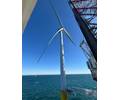
Oil prices looked set to close down this week following seven weeks of gains, as China's economic woes eclipse signs of tight supply.
The seven-week upswing in prices, galvanised by supply cuts by the Organization of the Petroleum Exporting Countries and allies (OPEC+), was the longest streak for both benchmarks this year.
Brent futures rose by about 18% and West Texas Intermediate crude (WTI) by more than 20% in the seven weeks ended Aug. 11, with prices hitting their highest levels in months.
The benchmarks pared some gains this week, slipping more than 3%.
Prices dipped on Friday. Brent crude slipped 65 cents to $83.47 a barrel as of 1235 GMT, while WTI edged 61 cents lower to $79.78 a barrel.
The focus has turned to consolidation after the general level of risk appetite "took a knock from strengthening macroeconomic headwinds from China growth to rising rate concerns," Ole Hansen, head of commodity strategy at Saxo Bank, wrote in a note on Friday.
China, the world's biggest oil importer, is seen as key to shoring up oil demand over the rest of the year.
But the country's post-pandemic recovery has been sluggish, weakened by tepid domestic consumption, faltering factory activity and ailing property sector, raising concerns that Beijing will not meet its annual growth target of 5% without substantial stimulus measures.
"Oil finds itself ... marooned in the shipping lanes of financial news and not even continued inventory draw is enough to allow the continued navigation in positive waters," said John Evans of oil broker PVM.
Data showed that U.S. crude oil inventories fell by nearly 6 million barrels last week on strong exports and refining run rates. Weekly products supplied, a proxy for demand, rose to the highest since December.
China also made a rare draw on crude oil inventories in July, the first time in 33 months it has dipped into storage.
Another factor weighing on prices are concerns that the U.S. Federal Reserve is not quite finished with hiking interest rates to tackle inflation. Higher borrowing costs can impede economic growth and in turn reduce overall demand for oil.
(Reuters - Reporting by Natalie Grover and Paul Carsten, Sudarshan Varadhan; Editing by Shri Navaratnam, Jamie Freed and Conor Humphries)



